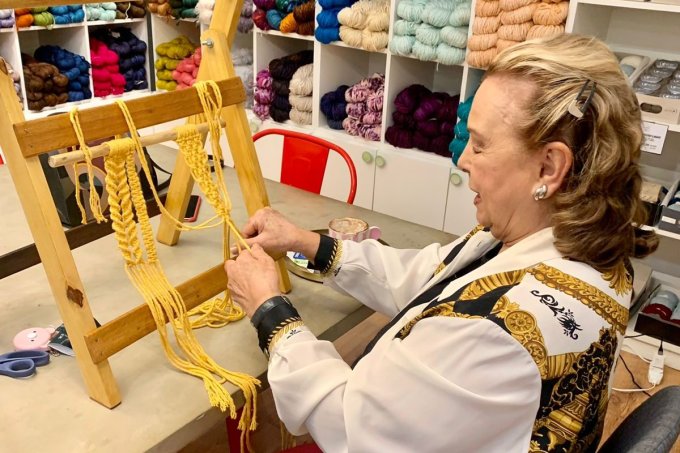Appreciated all over the world, Brazilian craftsmanship is a cultural tradition and a craft that crosses generations, generally taught from parents to children. In interior decoration, including handmade pieces is a way to bring personality and history into the home. No wonder, many of the videos of Do It Yourself available on social networks teach you how to produce a piece for your home.
From an amateur perspective, not only the poetry of decorating with own creations is born, but also a form of therapy at the fingertips, since manual activities act on the brain by stimulating neuronal pathways related to attention, memory, organization, planning and mood.
According to an expert, manual arts are like physical exercise for the brain (Julian Mora/Unsplash)
As explained Nina Ferreira, psychiatrist, specialist in schema therapy, neuroscience and neuropsychology, they are like physical exercise for the brain. “They also lead to an improvement in the action of neurotransmitters, such as serotonin and dopamine, generating a feeling of happiness and well-being. In other words, they can play a role in improving brain chemistry and mental health and help prevent depression and pathological anxiety”, continues the specialist.
The benefits listed by the doctor are experienced by the retired teacher Christina Ferreirawho at age 80 takes macramé classes.
“Manual arts bring many benefits to health and well-being, such as socialization, improvement of motor coordination, development of laterality, and it contributes to the development of attention. For me, it’s occupational therapy,” says Christina, who uses the hobby to help those in need and has already made more than 800 knitted jackets to dress vulnerable children.
At Novelaria, in São Paulo, it is possible to find knitting, crochet, embroidery, macramé and sewing classes (Espaço Novelaria/Disclosure)
“Besides all that, I also wanted a happy place, with happy people, who enjoy life, making new friends, talking”
Christina Ferreira, takes macrame classes
Christina takes classes at soap opera, a knit café in São Paulo, which combines wool, yarn, needles and accessories for various types of handicrafts and classes in knitting, crochet, embroidery, macramé and sewing. The space was founded by Aida Fonseca in 2011 and, since then, has become a tourist spot in the city of São Paulo.
Continues after advertising
“We receive caravans from the countryside with visitors who spend the whole day here at the store”, he reveals. Over there, 95% of the product catalog is imported, from Japanese needles to threads from various corners of the world, such as Peru, Uruguay, Portugal and Italy.
And amid so much variety, the retired business administrator Cecilia Rodrigues has been attending her knitting classes for 11 years. “For me, it’s relaxation. I knit and crochet watching TV, talking with my friends. I have fun knitting, I occupy my hands. It’s very good for the mind. It’s like therapy,” she says.
Novelaria is a São Paulo space that combines wool, yarn, needles and accessories for various types of handicrafts (Espaço Novelaria/Disclosure)
Focus on the present and other mental health benefits
Psychiatrist Nina Ferreira agrees with the administrator’s experience: “when concentrating to perform manual activities such as knitting and crochet, the brain enters a state of flow of action, in which it maintains full attention, in a kind of meditation. This training is useful for several other situations that the person may experience – such as practicing work activities, studies, conversations with other people – facilitating a more focus on the present moment and on important details and more mastery of one’s own thoughts, feelings and behaviors ”.
The relationship is a win-win: if, on the one hand, having handmade pieces transforms the decoration or wardrobe, with the affection embedded in the development of the item, the gesture of making it by hand improves the mood, reducing feelings such as melancholy, sadness , anxiety and anguish.
Manual arts lead to an improvement in the action of neurotransmitters, such as serotonin and dopamine, generating a feeling of happiness and well-being (David Vilches/Unsplash)
“While crocheting watching TV or talking to someone, I am producing something with my own hands and at the same time having a moment of relaxation”
Cecília Rodrigues, takes knitting classes
The psychiatrist also points to improvement in attention span and to live the present moment; O increased self-esteem and self-confidence (through the feeling of accomplishment when completing a personal goal or project); and the social connection ability (for the exchanges that take place when doing group work or when interacting to learn about the topic).
“All of this exercises the brain, not only reducing the risk of illness (depression, insomnia, anxiety disorders), but also improving neurological and mental power and the regulation of emotions and behavior”, explains the expert.
It is worth mentioning that the activities are considered a complementary treatment to the psychiatric and psychotherapeutic monitoring of conditions such as depression, anxiety disorders, bipolar mood disorder and others.
“It is essential to go through an evaluation with a psychiatrist or a psychologist to have a specific psychological examination and, thus, be able to draw up an individualized treatment plan, which contains the correct indications for that particular case”, concludes the doctor.
Continues after advertising
